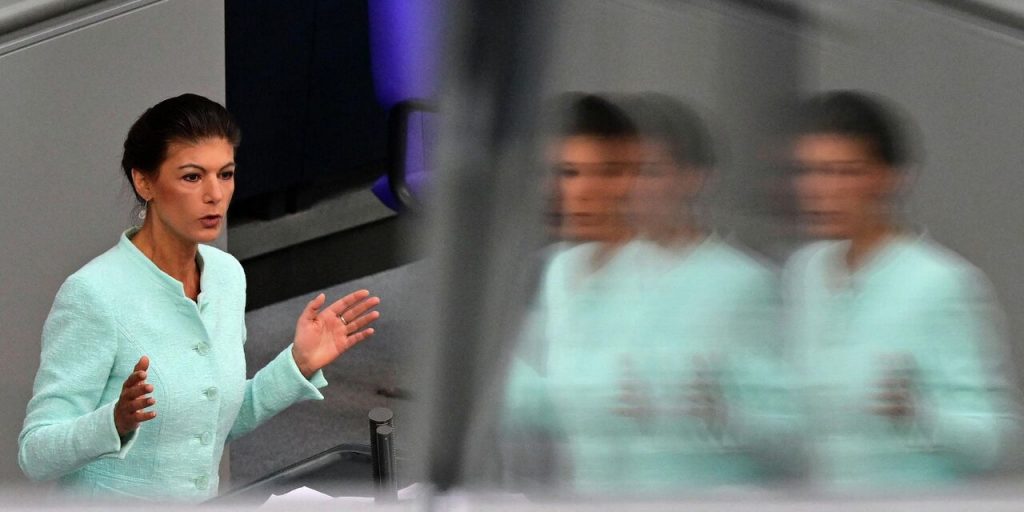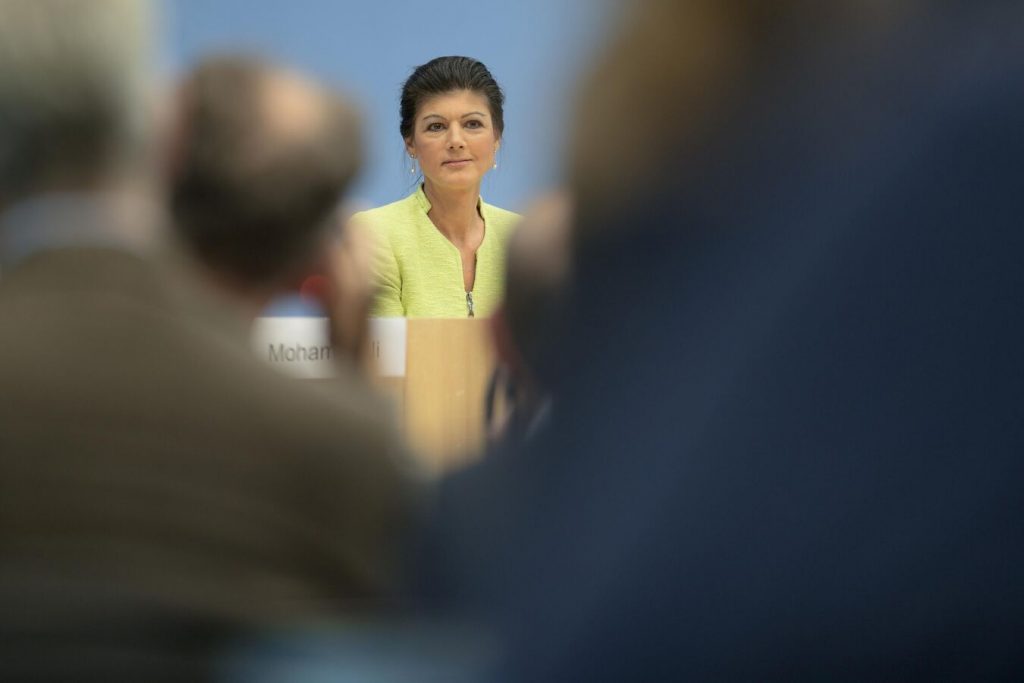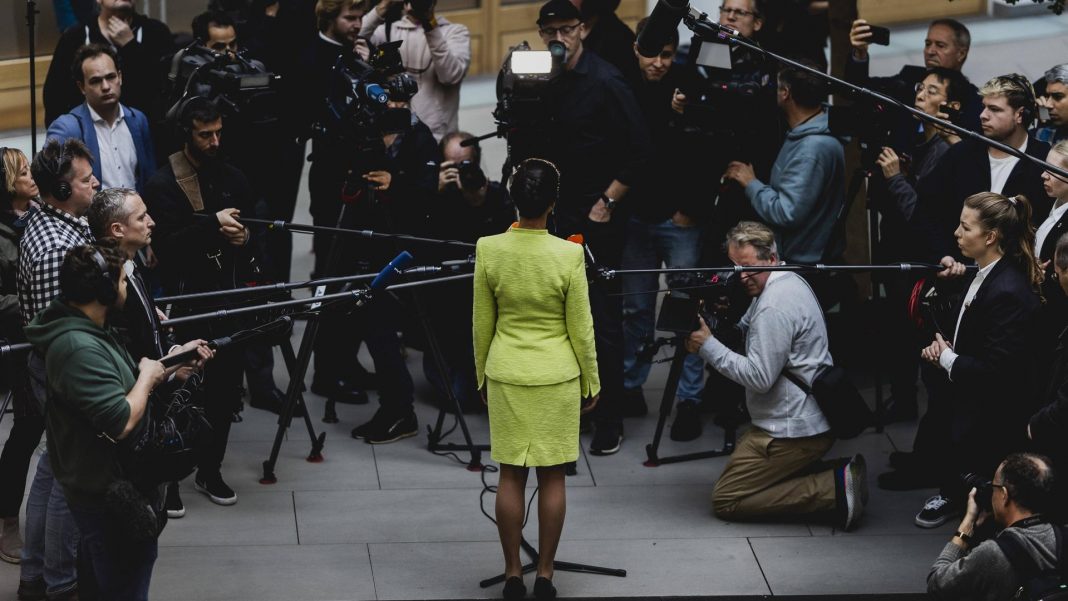The year 2024 in Germany began with two important and, obviously, far-sighted events. On Monday, January 8, thousands of farmers began protesting against the federal government’s policies. At the same time, Sarah Wagenknecht presented a new party, “Sahra Wagenknecht Alliance – Reason and Justice” (German: Bündnis Sahra Wagenknecht – Vernunft und Gerechtigkeit, or BSW). As noted, the name of the party will be changed later.
The party’s co-chairman was the former leader of the left faction, Amira Mohammed Ali. The party’s deputy chairman is a businessman and university professor Sherwin Hagsheno, and Bundestag member Christian Leie became the general secretary. The first congress of the BSW federal party is scheduled for January 27 in Berlin; only a public presentation took place on January 8.
The new party plans to participate in the European elections on June 6-9, 2024. Former left-wing politician Fabio De Masi and former Düsseldorf mayor Thomas Geisel will lead the new party in the European elections. At the same time, Wagenknecht does not plan to run for the European Parliament and has announced that she will not be a candidate in national elections.
BSW also plans to participate in regional elections in Thuringia, Saxony and Brandenburg, due to take place in September 2024. “We are confident that we will compete in all three elections,” Wagenknecht said at a press conference on the occasion of the party’s presentation.
“We won’t be able to offer you much programmatically today,” Wagenkhnet said in the 5th sentence of her opening statement. The preliminary party program consists of only four pages.
Economy: Fairer tax system, more robust middle class and warmer relations with Russia

The party’s presentation stated its desire for “an innovative economy with fair competition, well-paid, safe jobs, a high share of industrial value creation, a fair tax system and a strong middle class.” “German foreign policy should be based on trade relations with the largest number of partners, rather than on expanding sanctions that threaten energy supplies.” Accordingly, the party officially advocates a significant easing of sanctions.
The party also integrates environmental policy into economics. Climate change is described as a “serious problem” that should not be ignored. However, “blind activism and hasty measures” are counterproductive. The most effective means of combating climate change are innovative key technologies, best developed in Germany.
At the same time, BSW is calling for “massive investment” in the education system, public infrastructure and administration. However, the presentation did not state where the funds for these investments should come from.
Social policy: higher pensions, better wages, more collective agreements
BSW’s social policy is classic leftist. Wagenknecht’s party criticises financial inequality, the lack of kindergartens, humiliatingly low pensions and the rising cost of living. BSW wants to counteract this with “productivity-oriented wages, safe work and good working conditions.” According to party representatives, approaches to collective agreements must be reconsidered for this to happen.
Foreign policy: no arms deliveries, no German soldiers in war zones
BSW’s foreign policy is actually based on the approaches of former Chancellor Willy Brandt and the last President of the Soviet Union, Mikhail Gorbachev: “a policy of weakening, a balance of interests and international cooperation,” which puts diplomacy in the first place and neutralises militarisation: “We fundamentally reject the solution,” noted in a programme.
The program also criticises NATO and the United States. “Our goal is an independent Europe of sovereign democracies in a multipolar world, not a new bloc confrontation in which Europe is trampled between the United States and an increasingly confident new power bloc around China and Russia.” In this case, we can talk about a direct appeal to Charles de Gaulle’s ideas and the European development model he proposed.
Freedom: Conservative Migration Policy – “Migration is not the solution to global poverty”
In the past, Wagenknecht has repeatedly faced accusations that she was collaborating with supporters of the Alternative für Deutschland, or AfD. However, the party program notes: “We reject right-wing extremists, as well as racist and racist ones.”
At the same time, the position regarding freedoms and rights of the BSW is definitely more liberal than that of the left. As an example, “cancel culture, oppression due to divergent positions and views, and increased censorship” are defined in the party program as “incompatible with the principles of a free society.” The language was also mentioned several times during the press conference. The term “gender” is not mentioned in the program at all, but Wagenknecht has repeatedly publicly spoken out against “gender rights,” also rejected by the majority of the population.
BSW opposes uncontrolled migration. “Migration is not the solution to poverty in our world.” Instead, it is proposed to invest in developing prospects in migrants’ home countries. This approach is markedly contrary to the approaches of the left.
A detailed party program must be developed and presented before the Bundestag elections, which will take place in 2025. It is also reported that external expert councils of the population will be involved in developing the program.
First impressions

Even though Sarah Wagenknecht’s party, the Sarah Wagenknecht Alliance – Reason and Justice, has already been dubbed as pro-Russian and oriented towards right-wing ideology, several statements and positions of members of the new political force demonstrate that its main idea can be relied upon, which pose a severe threat to the European politics.
On the eve of the elections to the European Union, such a political force could become a unifying factor for many politicians whose views focus on conservatism, the desire to reduce US influence on Europe, economic development, solving the migration problem and creating a new geopolitical architecture.
In essence, Wagenknecht’s previously voiced ideas are based on the need to return to the concept of a strong and sovereign Europe, where Washington, London and Moscow act as partners and not as factors of direct influence and pressure in strategic matters. In this context, attention should also be paid to the growing voices regarding renewing an internal EU defence union (following the example of Permanent Structured Cooperation, PESCO).
Of course, the “Alliance Sarah Wagenknecht – Reason and Justice” shortly should face several challenges that will largely determine the further formation of its ideological foundations; however, if the primary idea is preserved, it can be predicted that soon adherents may appear in the party many EU countries.


